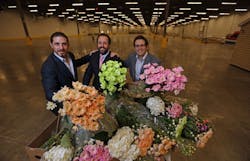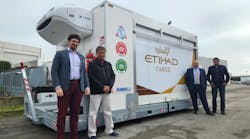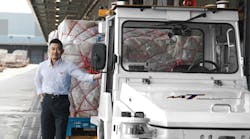March 18--As Alfonso C. Rey, founder and chairman of Centurion Air Cargo, tells it, he moved to Miami from Argentina in 1986 with $7,000 in his pocket and "zero -- negative 10 percent" knowledge of English.
His punchline: "Today, I have less than $7,000."
Belying his remark: Rey, 51, has just moved his Miami-based air-cargo business into a new 800,000-square-foot facility on prime land at Miami International Airport. The highly automated, state-of-the-art center at 4500 NW 36th St. should enable Centurion to save time and money over the scattered locations it previously occupied at MIA and offers huge room for growth.
Centurion is hiring. Its fleet is growing. And the company is eyeing new markets, some of them beyond its U.S.-Latin America stronghold.
Yet Rey's quip about finances hints at the perilous nature of the air-cargo industry, a cutthroat arena of razor-thin margins that is shaped largely by outside forces from the economy to the weather to labor relations to politics to war.
Investor Warren Buffett's famous line -- "How do you become a millionaire? Make a billion dollars and then buy an airline" -- is equally fitting to the cargo side of the aviation business.
For years, the air-cargo industry has been plagued with too much capacity chasing too little business. Jet fuel -- the single largest cost, currently consuming more than 40 percent of expenses -- is essentially beyond management's control. Since the terror attacks of Sept. 11, 2001, security costs have skyrocketed and regulations are tough.
Last week, a shipment of horses from Miami to Caracas was postponed after the death of Venezuelan President Hugo Chavez held up paperwork. When Chile's salmon industry suffered production woes several years ago, it crimped shipments of fresh fish to Miami. Volcanoes, earthquakes, hurricanes all mean delays and missed opportunity.
"Everything that affects your life every morning affects our business," said Rey, who built his privately held cargo business through a series of acquisitions, some in bankruptcy-court proceedings. He has bet heavily on Miami's place as the gateway to Latin America, a position that has blossomed fully in recent years.
"I've always believed in Miami," he said. "Now, we are the geniuses: Miami is the center of the planet."
Miami International Airport, which is owned and operated by Miami-Dade County, ranks third among U.S. airports for air-cargo volume and is number one in perishable cargo, accounting for 69.7 percent of U.S. airport tonnage in 2011. The lion's share of that is fresh fruits and vegetables, flowers, and fish, coming from Latin America. No other airport is even close.
Miami-Dade's outgoing aviation director, Jose Abreu, recently told local business leaders that cargo traffic at MIA rose more than 4 percent in 2012 to a record 2.1 million tons.
About half of Centurion's cargo is perishable: Besides fish from Chile, it carries fresh flowers from Colombia and Ecuador, and asparagus from Peru. Southbound, the fleet of McDonnell Douglas MD-11 freighters carries a lot of electronics and telecom equipment, car parts and other manufactured goods. The carrier has carved out a niche in transporting horses, including Argentinian caballos criollos, the beloved steeds of the gauchos, which are popular, among other things, in polo.
Centurion and an affiliate, Sky Lease Cargo, run neck and neck with Chilean-based LAN Airlines, for the top spot in air-cargo shipments between Miami and Latin America. Rey said his firms generated about $750 million in revenue in 2012, a "bad year" in which the firm essentially broke even. He hopes to hit $1 billion in 2014 and double that by 2016, growing the fleet from the current 11 MD-11Fs and two Boeing 747Fs to 18 MD-11Fs and 10 additional 747-400Fs.
Yet Rey has attracted relatively little media attention. "We're very low key," he said. "Perhaps it's my personality."
In 2011, he made headlines in Miami when he won a bankruptcy-court auction for the high-profile home at 15 Star Island Dr. for $12.6 million. The bayfront mansion had belonged to since-convicted fraudster Claudio Osorio. Rey has put the property back on the market for $16.9 million.
In 2010, Rey was in the news in Brazil in connection with a political corruption scandal that Rey says had nothing to do with him. The newspaper O Estado de Sao Paulo reported that Master Top Linhas Aereas, a Brazilian carrier that had government contracts for airmail service there, actually belonged to Rey, and was using a Brazilian " testa de ferro,'' or frontman, to disguise its ownership. Brazil, like the United States, has restrictions on foreign ownership of airlines.
Col. Eduardo Artur Rodrigues Silva, the alleged frontman, left his post as director of operations at Brazil's postal service after the report and denied any impropriety. Master Top lost its mail contracts and air license, according to news reports.
For his part, Rey told The Miami Herald he never owned Master Top, but rather had provided the company support, including "airplanes and a sales force." Rey said Rodrigues had represented him on some aviation issues in Brazil, but was never a frontman for him. "They made a major investigation. Nothing was found," Rey said. "I never get involved in politics in any country."
Rey said he gravitated to the hyper-competitive air-cargo industry, though he has no particular fondness for airplanes. He worked initially in Miami for a small Argentine-flagged cargo line -- Servicios de Transportes Aereos Fueguinos S.A., or STAF Airlines -- that years later, in 1991, he would end up buying.
"The real story of this business is my father," says Jonathan Rey, 25, who was born and raised in Miami and is director of sales, charters, and live animal operations for Aerolog, a logistics affiliate. "He started out running a forklift. He's a workaholic."
In 1997, Rey and partners launched Cielos Del Peru, a Peruvian-based carrier that operated Boeing 707F and McDonnell Douglas DC-10-30F jets. Rey said he has since sold the company.
In 2001, he bought the air operating certificate of Challenge Air, which had been the biggest all-cargo carrier to Latin America when UPS acquired its assets in 2000. He renamed the business Centurion, marking the beginning of his U.S.-flagged cargo business with U.S. planes flown by U.S. pilots.
Plans for the new MIA headquarters were launched in 2007. Centurion joined with Annapolis, Md.-based Aeroterm to negotiate a 30-year lease with Miami-Dade for 43 acres of airport land along Northwest 36th Street west of LeJeune Road. Much of the space in the northeast corner of MIA once had been occupied by Eastern Air Lines and remained underutilized since its demise in 1991.
Under the agreement, Centurion assigned the lease to Aeroterm, a specialist in airport-terminal development, which designed and built the $130 million facility. Aeroterm and Bristol Group Inc., a San Francisco-based real estate investment and development firm, put up the money for the project. Centurion, in turn, is leasing it back from Aeroterm, which has done other projects at MIA, including developing the FedEx and LAN facilities.
A blizzard of obstacles, including the recession and delays in removing tenants from the space, stalled the start of the project, which finally broke ground in November 2011. Stiles Construction built the facility.
An old metal-plating shop located on the site was heavily contaminated and proved to be a major environmental challenge, costing several million dollars to resolve.
"Neither we nor the airport knew there was such a level of contaminants," said Erin Gruver, executive vice president of Aeroterm, who oversaw the project. "There were sub-surface contaminants. The walls, the slab, were all saturated."
To work around the cleanup, workers erected the eastern and western ends of the new facility first, moving toward the middle, where the contaminated facility was located. The structure was decontaminated and gingerly dismantled. Debris was sent to special, lined landfills, Gruver said.
The new facility includes 159,684 square feet of refrigerated storage space -- which Aeroterm says is the largest airport cooler in North America. It's designed to handle a growing flow of flowers, fruits and vegetables, and fish imported from Latin America. To the east of the cooler is a giant general cargo facility; to its west side, 100,000 square feet of office space. Further west lies a newly refurbished 300,000-square-foot hangar.
Centurion, which historically has outsourced its aircraft maintenance, is transitioning to bring that work in house, a move that should generate between 300 and 600 new jobs over the next three years, Rey said. Though its fleet is comprised of older jets, Rey said it is the best suited for the job.
The new warehouse facility, which automates many functions that previously required manpower, is expected to boost Centurion's competitiveness in handling perishables along the "cold chain,'' where time and temperature control are crucial.
"It's a world-class airport facility," said Ian Morgan, who joined Centurion as president in February. "It raises the bar in Miami in what can be expected for handling perishables."
The new building opens on the south to a sprawling air ramp area, where cargo is moved to and from planes. On the north, or landside, of the warehouse are loading ramps for some 90 tractor-trailer trucks. Aeroterm said consolidating operations under one roof will save trucks an estimated 35,000 miles a year.
"Centurion was in many locations before. They incurred trucking costs to and from, and some facilities were off airport," said Gruver. "[The new center] saves on transportation and reduces pollution and congestion.''
Centurion's affiliate, Sky Lease Cargo, was created in 2008 when Rey acquired assets of Tradewinds Airlines, which was in bankruptcy proceedings. Sky Lease's management is based in Greensboro, N.C., but the carrier flies out of Miami.
Among other things, Sky Lease operates military charters to Europe and the Middle East, and provides contract services for freight forwarders and other cargo carriers, Rey said.
In 2009, Rey acquired Lynx Global, which focuses on logistics for perishable cargo. "Logistics is the next chapter for us," said Rey, who sees growth potential in services that help forwarders and shippers do their jobs better.
The following year, he added Arrow Air Cargo to his portfolio. His carriers are also entering new markets.
In 2011, Centurion launched service to Amsterdam's Schiphol Airport as a first step in its expansion to Europe. Amsterdam is a big market for fresh flowers. Plans call for expanding service in Eastern Europe and Asia as its fleet adds more Boeing 747-400Fs.
"We're going to change the market in air freight," said Rey. "No doubt."
Copyright 2013 - The Miami Herald




